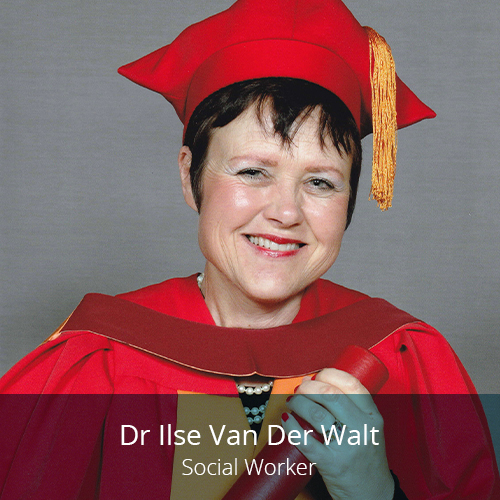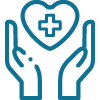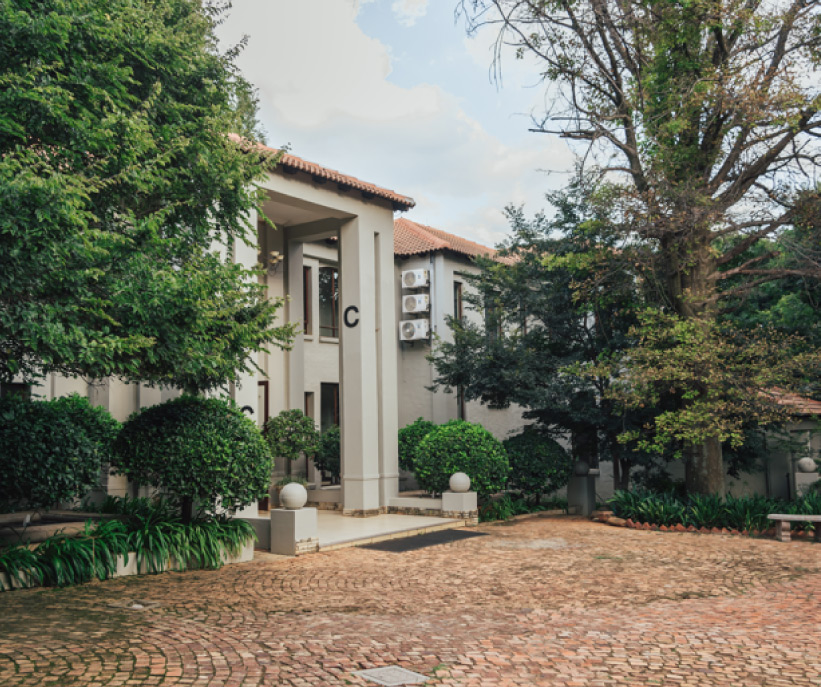Dr. Ilse van der Walt

“Your wings already exist. All you have to do is fly.. “
Introduction:
Ilse has 42 years of experience and expertise in the field of Social Work in Health. She is a very dedicated team player and advocates for the rights of the mentally ill. She is someone who values integrity, respect, and honesty.
Her genuine passion for people, experience and educational journey has shaped her to offer those who cross her path, with her compassionate and caring personality and commitment.
Mental illness has social and emotional implications for the patient, his or her family and the community. The Social Worker aims to work with the patient and family to help them cope as effectively as possible with their particular situation and to prevent the development of additional problems.
Social Work is the vocation that helps people to help themselves.
Short summary:
PRIVATE PRACTICE, From 1 July 2023.
WESKOPPIES PSYCHIATRIC HOSPITAL, Pretoria: 1 August 1990 – to 30 June 2023.
- Social Worker who has been working with adults on an in and outpatient basis with a variety of psychiatric diagnoses.
- Psychosocial assessments for the accused are referred to Weskoppies Hospital in terms of the Criminal Procedures Act.
- Developed a psycho-educational program, the SEE-SAW program, for the caregivers of mental health care users with the diagnosis of bipolar disorder.
- Developed a program for the utilization of animals for therapeutic purposes within the context of the psychiatric hospital. The program is still ongoing.
- Started a support group for mental health care users and their families at the Outpatient Clinic.
- Supervisor of students at different Universities (University of Pretoria, UNISA and University of Limpopo) and Social Workers.
- Chairperson of the Human-Animal Interaction Committee, from 1996.
- Member of different committees e.g., Friends of Weskoppies (volunteers), Training Committee, Motivational Committee, Community Outreach Committee, Committee for Sexual Awareness, Work Group for Substance Abuse, Employment Equity Committee and Management Committee at Social Work Unit.
- Coordinator of Training within the Social Work Unit.
- Guest Lecturer at the University of Pretoria to medical students, physiotherapy students, occupational therapy students and social work students.
- Member of the panel to select students for MA Degree in Health at UP for several years.
- Member of the panel working on specialization for Social Workers in Health under the guidance of the SACSSP.
- Member of the Bipolar Support Group in Pretoria and attended meetings at night.
NATIONAL CANCER ASSOCIATION, Cape Town: 1 August 1988- 31 July 1990.
- Worked in the hospice with terminal patients and their families.
- Did home visits to cancer patients and their families to assess their needs.
- Volunteer Coordinator in the Western Cape area. Coordinated training for volunteers.
SOMERSET HOSPITAL, Cape Town: 1 May 1987-31 July 1988.
- Worked in the Pediatric Section and Chirurgical Wards.
- Worked with HIV patients at the beginning of the AIDS pandemic.
- Supervision to a Social Work student from the University of Cape Town.
TYGERBERG HOSPITAL, Bellville: 1 December 1981 – 30 April 1987.
- Worked in the Renal Unit, part of the MDT evaluating patients for renal dialysis.
- Coordinated a group of renal patients to take part in the Transplant Games in Johannesburg and Stellenbosch.
- Supervised students at the University of Stellenbosch and Social Workers.
- Involvement with the Cape Kidney Association. Addressed different audiences on the Role of the Social Worker in the Health Sphere.
Qualifications:
MBChB
M.Med (Psych)
Dr. Ilse van der Walt's area of expertise:

Psychosocial assessment
Studies have shown that certain disparities exist between mental health and gender. Distinct patterns in mental illness exist along gender differences, and by taking the biological implications into account, you can better treat and manage mental health conditions in women.

Discharge planning
It is very important that discharge planning should start upon admission. If proper discharge planning is not done, the chances of the patients relapsing is very high. Patients feel protected while being hospitalized but must be empowered while being in the hospital to face the “outside world”.

Linking patients and families to relevant resources in the community
The Social Worker has a vast knowledge of resources that are available for different needs and can collaborate with the patient, caregivers, and other team members in this regard. Some patients must seek alternative accommodation or must be referred for long-term hospitalization or to a rehabilitation centre.

Psychoeducation for patients and families
The Social Worker can explain mental illness to patients and their families in terms that are understandable to them and provide literature to them to improve their knowledge. Once they understand, their compliance usually improves.

Utilization of animals for therapeutic aims
The Social Worker started the Human-Animal Interaction program at Weskoppies Hospital in 1996. She is aware of the therapeutic benefit of animals for patients with mental illness.

MDT
The Social Worker always respects the role of each member of the multi-disciplinary team. She or he should know the scope of practice.

Aftercare services
It is very important to remember that most psychiatric illnesses have long-term effects. The Social Worker can follow up after the discharge of a patient with either the patient or the family to take steps before a possible relapse.

Appointment of an Administrator
The Social Worker knows the process of appointing an Administrator via the Mental Health Care Act. This is applicable when a patient can no longer manage his/her estate because of a mental illness.
Ageing with Attitude
By Ilse van der Walt

On December 14, 1990, the United Nations General Assembly declared October 1 the International Day of Older Persons, which was first observed worldwide in 1991. South Africa commemorates the day as part of National Older Persons Week and Social Development Month.
In light of the worldwide celebration of the International Day of Older Persons, Ilse van der Walt considers the question: Are elderly people valued?
Although the younger generation might respond positively to this question, older people might have a different experience — that they feel mostly not valued in modern society. To prove this, one could argue that cases of the elderly being abused, harassed, and abandoned are soaring, and more often children are leaving their parents alone to fend for themselves.
We know that the younger generation operates at a fast pace and is often impatient when the older generation does not keep up with new developments. Moreover, there is a failure to understand the importance of elderly people in society. Older people are regarded as a burden, as if they cannot adapt to learning new skills. Nothing could be further from the truth. According to research, the human brain never stops growing.
The Ageing Population Is Growing
As people are living longer, the population of older people is growing significantly. The World Health Organization states that by 2030, one in six people in the world will be aged 60 years or older. Soon, older people will outnumber the young. This brings with it many societal and financial challenges. It becomes increasingly important to gain insight and understanding into how older people are included in an equal society.
We must acknowledge the role that older people play in current and future societies and economies and ensure that institutions and structures enable them to fully contribute to their families and communities.
Older people are often stereotyped as immobilised and sick, or as people who do not have anything to offer society. The truth is that they can adapt to their changing circumstances and wish to contribute to the societies they live in for as long as they possibly can. Across developing countries, there is evidence of the productivity, creativity, vitality, and participation of older people in workplaces, communities, households, and families.
Skills, Knowledge, Experience, Wisdom
Seniors often possess a wide range of skills and knowledge gained from years of work and life experience, making them valuable assets in various roles. They have wells of wisdom which serve as a resource for the younger generation. An old (wise) person is someone who has withstood all the storms of life and can offer a 360-degree perspective on it.
From all the experiences they have accumulated over the years, seniors can judge a situation and give constructive advice to their children and grandchildren. They also play an important role in solving disputes among family members.
“Listen to your elder’s advice. Not because they are always right, but because they have more experience of being wrong.” — Melchor Lim
1. Time and Flexibility
Many seniors have flexible schedules, allowing them to dedicate more time to others compared to younger individuals with work or family commitments.
2. Community Connection
Seniors often have strong ties to the community and a deep understanding of local needs, allowing them to contribute effectively.
3. Long-Term Commitment
Seniors are more likely to commit to roles and tasks, providing stability and consistency. They offer dedication.
4. Mentorship
Seniors can serve as ideal mentors and role models for younger people and community members, sharing their wisdom and guidance.
5. Maturity
The loss in reaction time and brain activity leads to gains in decision-making and insight. Hence, elders are less likely to respond thoughtlessly to negative emotional stimuli and are more in control of their emotions. They can focus on what truly matters in life.
6. Values
Elderly people are the ones who preserve the traditional and cultural values present in any ethnic group or community.
Some Key Concepts
Successful ageing has been defined as “the ability to maintain low risk of disease-related disability, high mental and physical function, and active engagement with life.”
Positive ageing is joy, love, and learning.
A healthy lifestyle simply means doing things that make you happy and feel good.
Gogo — an endearing term of respect for an elderly person.
Our mental health is about how we think and feel — our outlook on life and how we cope with life’s ups and downs. It is an essential part of our overall health.
Valuable Assets of the Elderly
Can we still doubt? Seniors are like a goldmine — a treasure, a blessing for family, society, and nation — just waiting and ready to be explored.
Do you need professional help?
Alternatively, please contact us
010 475 0150
Emergency Calls: 066 255 8501Email: support@zsclinic.co.za or admin@zsclinic.co.za

GoodBased on 83 reviews
 Faith More2025-04-04
Faith More2025-04-04 Bonginkosi Nxumalo2025-03-28This is the best mental health clinic in the country. The facilities are out of this world, the food that we had while admitted was the best. The health professionals were the best. If you need to reset, if you feel as though things are heavy on you ask your medical Practitioner to do a referral for you. When it's time for you to be discharged you won't want to go home. The person who built this facility deserves all the blessings.
Bonginkosi Nxumalo2025-03-28This is the best mental health clinic in the country. The facilities are out of this world, the food that we had while admitted was the best. The health professionals were the best. If you need to reset, if you feel as though things are heavy on you ask your medical Practitioner to do a referral for you. When it's time for you to be discharged you won't want to go home. The person who built this facility deserves all the blessings. Khanyisile Mukhari2025-03-14I Highly recommend everything about this facility.
Khanyisile Mukhari2025-03-14I Highly recommend everything about this facility. Maarten Opperman2025-03-09Very friendly, approachable staff. CEO visits each and every table herself during lunch for feedback. They cater for individualised and special meals. The clinic has its own private vehicles to transport patients to Pretoria East Hospital, Wilgers Hospital for specialist referrals and radiological investigations. The clinic has a gymnasium and a big physiotherapy section. One-to-one private sessions with an occupational therapist, social worker, or pastoral therapist are available. Each patient consults a private psychiatrist and a private psychologist every day. No photos may be taken for medical confidentiality.
Maarten Opperman2025-03-09Very friendly, approachable staff. CEO visits each and every table herself during lunch for feedback. They cater for individualised and special meals. The clinic has its own private vehicles to transport patients to Pretoria East Hospital, Wilgers Hospital for specialist referrals and radiological investigations. The clinic has a gymnasium and a big physiotherapy section. One-to-one private sessions with an occupational therapist, social worker, or pastoral therapist are available. Each patient consults a private psychiatrist and a private psychologist every day. No photos may be taken for medical confidentiality. Rochelle Okkers2024-11-25
Rochelle Okkers2024-11-25 James2024-10-17Wonderful atmosphere Clinic is very hygienic All staff is helpful and highly trained and qualified Walking trails is very enjoyable The food is Devine and delicious Coffee shop is convenient for patients who want to visit friends and families Atmosphere is very scenic but worth the cost
James2024-10-17Wonderful atmosphere Clinic is very hygienic All staff is helpful and highly trained and qualified Walking trails is very enjoyable The food is Devine and delicious Coffee shop is convenient for patients who want to visit friends and families Atmosphere is very scenic but worth the cost Kaya Mbusi2024-09-12
Kaya Mbusi2024-09-12 zabesuthu khoza2024-09-01What an amazing experience I had with her. Dr Zwane is so patient, pays close attention to detail and very accommodating
zabesuthu khoza2024-09-01What an amazing experience I had with her. Dr Zwane is so patient, pays close attention to detail and very accommodating
In Affiliation with:
Zwavelstream Clinic is supported and affiliated with most medical aid schemes based in South Africa. To find out if your medical aid is covered by Zwavelstream Clinic, please contact us for more information.













